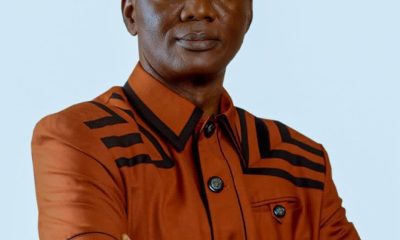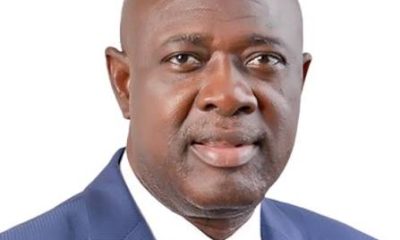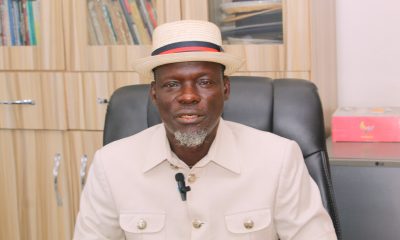National
Africa’s Energy Bank: A Beacon of Hope Amidst Hurdles, By Charles Tambou

By Charles Tambou
A quiet revolution is taking shape in Africa’s energy sector. For decades, African nations have depended heavily on Western banks and foreign investors to fund oil, gas, and power projects. But as those financiers turn away from fossil fuels, Africa is charting a new course by building its own bank, the Africa Energy Bank (AEB) and its headquarters is in Abuja, Nigeria.
The Africa Energy Bank is the brainchild of the African Petroleum Producers’ Organization (APPO) and Afreximbank, Africa’s trade finance powerhouse. Its mission is simple but ambitious, to raise about $5 billion to fund oil, gas, and power infrastructure across the continent. In other words, projects that foreign lenders are now reluctant to support.
For many African countries, this bank could not have come at a better time. From refineries and gas pipelines to power plants and energy storage, countless projects have been stalled because of lack of funding. By providing loans tailored to Africa’s realities, the AEB hopes to unlock energy development, boost local industries, and create jobs. Nigeria’s choice as the host country is seen as a big win, both politically and economically. As Africa’s largest oil producer and a leading gas hub, the country offers experience, technical expertise, and influence to guide the bank’s early operations.
Somehow, Africa’s energy story is full of contradictions. The continent is rich in natural resources but poor in power supply. Millions of homes still live in darkness, while industries run on costly diesel generators. Supporters say the Africa Energy Bank could change that by financing key projects such as gas-to-power plants, refineries, and transmission lines.
This can in the long run lead to supporting industrialisation, creating jobs and boosting exports. It can also encourage local content where African companies will be given more room to participate; and serve as a bridge to clean energy by investing in renewables, power grids, and energy storage.
If all goes well, the AEB could become a turning point in the engine room that powers Africa’s self-reliance in energy. But there could be roadblocks ahead to achieve the targeted goal as the journey will not be easy. First, there would be the issue of funding. Member countries and Afreximbank are expected to provide the seed money, but reports already point to disagreements over contribution shares and delays in releasing funds.
Without a strong capital, the bank will struggle to make an impact. Besides, there will be the question of global perception. In a world that is racing toward renewable energy, any institution that funds oil and gas projects risks criticism. Global climate campaigners may see the AEB as a step backward, which could make it harder to attract international investors and partners.
There may also be basic governance concerns. As a treaty-based multilateral bank, the AEB must be run transparently, free from political interference. Poor management or uneven participation by member states could easily derail confidence in the bank.
Recruiting skilled professionals, setting up offices, and building robust systems will take time and money. And without transparency and discipline, the bank could face credibility challenges even before it begins full operations. Supporters of the AEB, especially in Nigeria insist that Africa should not be rushed into abandoning its oil and gas resources. They argue that while developed nations can afford to go green quickly, Africa still needs its natural resources to power factories, hospitals, and schools. The goal, they say, is balance, which means developing fossil fuels responsibly, while gradually investing in cleaner energy.
This dual-track strategy could allow the AEB to finance gas projects in africa that replace dirtier fuels and, at the same time, fund solar farms, transmission networks, and renewable infrastructure. That way, the bank can power Africa’s present without mortgaging its future.
With Henekien Lokpobiri at the helm of affairs representing Nigeria, winning trust through transparency is assured. And experts agree that for the AEB to succeed, it must earn public and investor trust. This means operating with clear rules, independent credit checks, and of course, transparent procurement.
The bank must also meet international environmental standards to reassure partners that it will not finance projects that harm communities or the environment.
Setting up a project preparation unit the bank will be critical. Such a department can help African countries design and prepare ‘bankable’ projects, especially those that are attractive to investors and meet global best practices. Just as important, the AEB should engage civil society and climate groups early, making them part of the discussion on environmental safeguards and accountability. This means open communication which can turn potential critics into partners.
There will be a question of ownership and Vision. Beyond funding and governance, the AEB’s success will depend on political will. African governments must show commitment, not just in words, but in financial contributions and disciplined management. Any public quarrel between APPO, Afreximbank, or member states over control could send the wrong signal to the world, especially when global investors are watching closely.
The dream is that AEB will become a model, not just for financing energy, but for showing that Africans can cooperate and deliver results in their own interest.
The bottom Line, however, is that the Africa Energy Bank represents both hope and risk. One can say that it is a daring attempt by Africa to take charge of its destiny. Africans will no longer wait for the world to fund our development and with AEB, we can fund ourselves. If managed with transparency, foresight, and fairness, it could light up homes, power industries, and open a new chapter in Africa’s economic story. But if it falls into old traps like politics, mismanagement, or lack of accountability, then it could become just another missed opportunity. But for now, Africa and the world are watching, with AEB, our destiny is in our hands.













